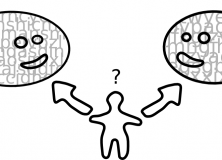How many languages do you speak? This is actually a difficult question, because there’s no such thing as a language, as I argue in this video.
This is a video of a talk I gave as part of the Edinburgh University Linguistics & English Language Society’s Soap Vox lecture series. I argue that ‘languages’ are not discrete, monolithic, static entities – they are fuzzy, emergent, complex, dynamic, context-sensitive categories. I don’t think anyone would actually disagree with this, yet some models of language change and evolution still include representations of a ‘language’ where the learner must ‘pick’ a language to speak, rather than picking variants and allowing higher-level categories like languages to emerge.
In this lecture I argue that languages shouldn’t be modelled as discrete, unchanging things by demonstrating that there’s no consistent, valid way of measuring the number of languages that a person speaks.
The slides aren’t always in view (it improves as the lecture goes on), but I’ll try and write this up as a series of posts soon.


That was a really interesting talk, thanks. I’m doing my MA (in philosophy, phil bio really) on the all languages are equal thesis. My supervisor and I keep getting sidetracked by the idea of a ‘language’, and why more people aren’t treating language like ‘species’. It’s really neat to see someone tackle the question like this.
Just out of interest, who have you been reading for your phil bio stuff?
I haven’t got any useful comments at the moment, I’ll see if I can come back to you on this. I just think this is a really really interesting area, and I love hearing about it. Cheers
I’m certainly not the first to be asking this kind of question – proponents of linguistic wave theory have been discussing it for a few decades. Also, Thomas Roeper’s theory of Universal Bilingualism has a similar angle. I’ve also been recommended to read The Native Speaker: Myth and Reality (Bilingual Education and Bilingualism) by Alan Davies.
I haven’t done much phil bio, but I read Peter Godfrey-Smith’s Darwinian Populations and Natural Selection which discusses how to define a Darwinian ‘individual’ and argues that there are gradations of Darwinian selection. Plus you get to learn about cool stuff like how ferns are really two species, or how the outer layer of a grape vine is closer genetically to plants on the other side of the planet than to its own inner layer!
Syd Lamb has some complementary remarks about multilingualism in the brain in Pathways of the Brain. His point is that A language is NOT one thing, but a mesh of interacting systems (pp. 43 ff.). In the brain of a multilingual person the lexical systems will be fairly separate, but there’s going to be considerable overlap in deep semantics and as for phonology, it depends on when the various languages were learned. But the phenomenon of a foreign accent is what happens when a phonological system tuned to one language is forced to realize a different one.
So, yes, I agree with your general point. The notion of a language as some more or less encapsulated entity that is distinct from all other such entities is not very plausible.
Yeah, sorry that was unclear. I’m sure that people have been using this kind of approach, but I haven’t come across it explained in this kind of way before – ‘hey, this is how we’re going to think about this’.
Yeah, Godfrey-Smith is a pretty good person to read for this.
One thing that I keep coming back to from your talk is your gene analogy. Wouldn’t a phenotype analogy work better here?
In most evolutionary biology simulations and/or models, they’re actually modelling the phenotype, but there’s a 1:1 ratio of genotype to phenotype. If you have the gene, you see the phenotype, if you don’t have the gene, you don’t see the phenotype. And sure, making this 1:1 assumption makes it a lot easier to model.
However I’m not quite sure if this is the same for language. Maybe something like a gene would be broad rules, with the phenotype being actual language production. This sort of approach could explain accents; the same ‘genes’ (in this case broad phonological rules) in different situations produce different ‘phenotypes’.
That’s just a vague idea, but I suspect looking at the genotype/phenotype distinction could be useful here. What do you think?